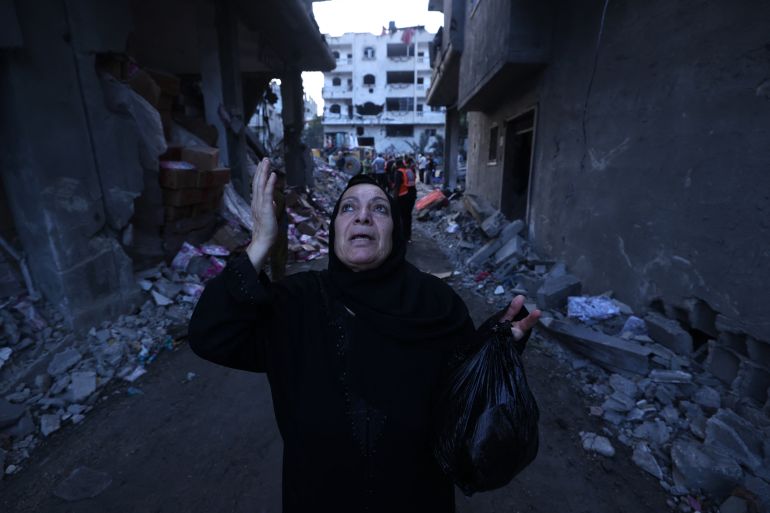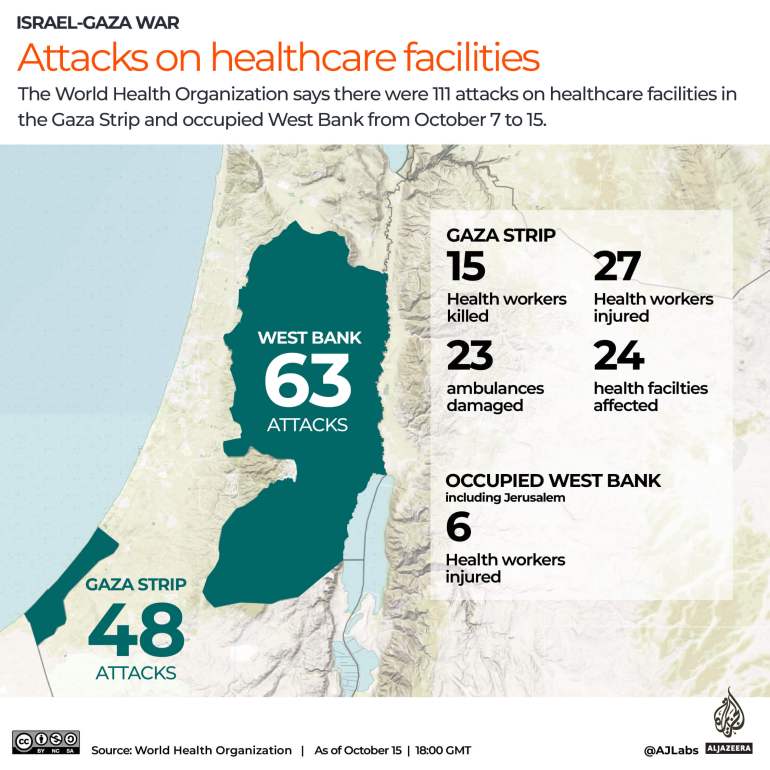Israel accuses Spain of siding with Hamas after ‘genocide’ accusation
Several left-wing politicians have called on Madrid to bring Israel’s Prime Minister Benjamin Netanyahu before the ICC, sparking a diplomatic row.

Madrid, Spain – Israel and Spain are embroiled in a diplomatic row after some Spanish ministers were accused by Israel of siding with Hamas in the Middle East conflict, a claim rejected by Madrid.
The dispute arose after left-wing Spanish politicians of the coalition government accused Israel of engaging in the “genocide” of the Palestinian people.
Keep reading
list of 3 itemsGaza at breaking point as Israel evacuates north
Israel-Hamas war: List of key events, day 11
Ione Belarra, the social rights minister who is also the leader of the Unidos Podemos, the far-left junior partner in Spain’s coalition government, has posted several times on social media in support of Palestine while criticising the Israeli occupation.
On Monday, she called on Spain to bring Israel’s Prime Minister Benjamin Netanyahu before the International Criminal Court for war crimes.
Spain’s equality minister, Irene Montero, echoed this appeal, saying the same call was made “a few weeks ago in the case of the [Spanish] aid worker murdered in the war in Ukraine”.
Montero has also posted on social media, declaring: “Violations of international criminal law and war crimes cannot go unpunished. Defending peace and human rights is today the most urgent task of all.”
We ask our partner that, as the Government of Spain, we bring Netanyahu before the International Criminal Court for war crimes. Here is my official statement 👇 pic.twitter.com/Wuu8nnKfVp
— Ione Belarra (@ionebelarra) October 16, 2023
The Israeli Embassy in Madrid said in a statement issued on Monday that some Spanish ministers, who were not named, were siding with the Palestinian group Hamas, which more than a week ago launched a deadly offensive in Israel that took the world by surprise and set off a major new war.
The embassy said that it was “deeply worrying” that “certain elements within the Spanish government have opted to align themselves with this terrorism of ISIS type”.
Israeli officials, including Netanyahu, have repeatedly said that “Hamas is ISIS” since the group’s October 7 attacks. The Israeli army also claimed an ISIS flag was found at the site of an assault.
Since Hamas’s incursion, during which the group is accused of killing hundreds of civilians and capturing several others, Israel has blockaded and bombarded the Gaza Strip, the besieged enclave ruled by the Palestinian group.
Hamas has denied intentionally killing civilians, but acknowledged “collateral damage” was possible. It has also admitted to taking several Israelis hostage.
Overall, more than 4,000 people – including Israelis, Palestinians and some foreigners – have been killed in 10 days.

The dispute is certain to strain Israeli-Spanish diplomatic relations and show how the Israel-Hamas war was spilling over into European relations, analysts said.
Spain and Israel only established diplomatic relations in 1986 after decades of no contact during the rule of General Francisco Franco, which ended in his death in 1975.
Israel demanded that Spain’s acting Prime Minister Pedro Sanchez condemn the “absolutely unmoral” remarks made by his government’s ministers, saying that they endangered the safety of Jewish communities in Spain.
Spain’s Foreign Ministry hit back late on Monday, issuing a statement that criticised the embassy statements as “falsehoods”.
It said the Spanish government condemned the Hamas attacks on Israel and called for the protection of civilians in Gaza.
“Any political leader can freely express their positions as a representative of a political party in a full democracy such as Spain’s,” it added.
Spain recently backed a recent diplomatic deal between Morocco and Israel, ending years of antipathy between Rabat and Jerusalem.
Belarra, the social rights minister, denied the claims made by the Israeli Embassy in Madrid.
“Denouncing this genocide is not ‘aligning with Hamas’,” she said. “It is a democratic obligation. Silence, complicity with terror,” she said in a post on X, the social media platform formerly known as Twitter.
Earlier on Saturday, wearing a tracksuit with the red, green, white, and black of the Palestinian flag, the Podemos parliamentary spokesman Pablo Fernandez appeared before a televised press conference on Monday.
Meanwhile, Montero, a senior figure in Podemos, has claimed in a social media post that Netanyahu “asked in 2019 (in the Israeli parliament) to finance Hamas. Violations of international law and war crimes will never count on our complicity or our silence. We defend democracy and life”.
After July’s inconclusive elections, Spain’s acting government is led by the Socialists and supported by two junior far-left parties Unidos Podemos (Unite Together) and Sumar (Add Up) as well as regional groups.
As the Socialists try to form a new government by garnering the support of smaller parties, Sumar, which is led by Deputy Prime Minister Yoland Diaz, called for Spain to recognise Palestine as an independent state.
The political divisions over the Israel-Hamas war forced Prime Minister Sanchez to break off from a European Union conference in Albania on Monday to clarify Spain’s position, which was at loggerheads with that of his far-left allies.
“I would like to reiterate our condemnation of the Hamas attack against Israel. Israel has the legitimate right to defend itself within international law and humanitarian law,” he told journalists. “At the same time, the protection of civilians is essential, as is access to international aid for those in need, especially in the Gaza Strip.
“The only way to resolve the conflict is the recognition of the two states, so that they can co-exist in peace and security.”
The row prompted opposition right-wing parties to accuse Sanchez and his political allies of tarnishing Spain’s image abroad.
Alberto Nunez Feijoo, the leader of the opposition conservative People’s Party, told reporters in Madrid on Tuesday that Spain’s response to a complaint by Israel was “rude”.
“Israel is a country in shock. It is not the moment to have a conflict with Israel and unfortunately, we have it,” he said.
Santiago Abascal, leader of the far-right Vox party, the third biggest party in the Spanish parliament, said members of the Spanish government included “admirers of Hamas’s terrorism”.
Lluis Orriols, an expert in Spanish politics at the University Carlos III of Madrid, said the political splits within the Spanish left were to be expected, especially when a caretaker government had less discipline over what its members say than if it was in office.
“The points of view of members of Podemos on Palestine and Israel are not unknown, but the important thing is that in this acting government, the ones which dictate foreign policy are the Socialists,” he told Al Jazeera. “If the left forms another government, Podemos will play a less important role and Sumar will be more prominent.”
José Ignacio Torreblanca, Madrid director of the think-tank European Council of Foreign Affairs, said EU institutions had failed to adequately respond to the Israel-Hamas war.
“It is not so much about parties having different views, which we have known for long, but about the EU institutions malfunctioning, especially unilateral actions in contradiction with the EU High Representative Josep Borrell,” he told Al Jazeera.
“We’re used to member states’ differences, but the EU states should help find consensus, not reproduce and aggravate differences.”
About 50,000 Jewish people live in Spain, according to government statistics.
Two demonstrations in favour of the Palestinians took place in Madrid and Barcelona at the weekend.
Away from the world of politics, Spaniards like Gema Otero, a businesswoman based in Barcelona, said civilians are suffering the most because of the Israel-Hamas war.
“I don’t care much for who is right and who is wrong,” she told Al Jazeera. “There are people on both sides who are dying and suffering over a row which could be solved if they stopped fighting.”